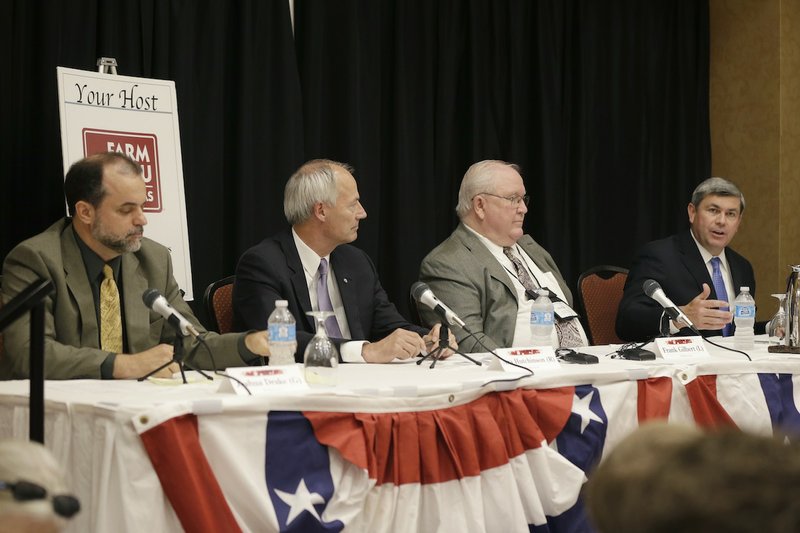In their first debate, Arkansas' gubernatorial candidates addressed hot-button topics such jail overcrowding; the controversies surrounding health care, gay marriage and the Arkansas Scholarship Lottery; and economic issues including minimum wage and the state income tax.
Democratic nominee Mike Ross, Republican nominee Asa Hutchinson, Libertarian candidate Frank Gilbert and Green Party nominee Joshua Drake faced off at the debate hosted Friday by the Arkansas Press Association in Hot Springs. The debate was moderated by Frank Fellone, deputy editor at the Arkansas Democrat-Gazette.
Opinions on gay marriage were split between the major-party candidates and third-party candidates. Ross and Hutchinson both stated they were personally against same-sex marriage and the issue should be handled by the U.S. Supreme Court, while Drake and Gilbert asserted that marriage should not be something governments can deny citizens.
When the topic of jail overcrowding was introduced, however, each candidate varied greatly in their plans to solve the problem. Gilbert called for pardons of all non-violent criminals, adding that while it’s uncomfortable to talk about, Arkansas incarcerates a large portion of the “black and brown” population over drug crimes.
“If you’re afraid of them, put them in jail,” Gilbert said. “If you’re mad at them, do something else.”
Ross said he was not opposed to building another prison and that tougher sentences in general would help reduce the number of inmates in jail. He said the real problem is the recidivism rate in the Arkansas justice system, and part of his plan would require people leaving jail to get a job or be a part of a re-entry program that works.
Drake said he didn’t have a lot to say about the jail overcrowding, but he believed that rehabilitation would be better than prison time.
Hutchinson focused on the drug problems in Arkansas, saying the problem is a lack of education and that he believes there should be better programs teaching kids in Arkansas to say no to drugs. Hutchinson alleged he was the only candidate to have rolled out an extensive crime plan.
The economic issues spread out over three major topics: minimum wage, the Arkansas Scholarship Lottery and taxes. Ross said he supports a gradual raise of the minimum wage to $8.50 by 2017, while Hutchinson said he supports it meeting the federal level of $7.25. However, Hutchinson said he believes it's a matter to be settled by the Legislature rather than voters. Drake said that minimum wage should be raised to $10.
The state lottery was completely disapproved by Gilbert, Ross and Drake, who all said that it should not have begun in the first place. Both Drake and Hutchinson proposed more regulation of the lottery. Hutchinson said the lottery should be considered a state agency with greater oversight, while Drake argued the government shouldn’t have a monopoly on gambling and the lottery should be allowed to run more freely but with smarter regulation.
Gilbert said the introduction of the lottery brought a lot less money and a lot more theft.
“If we do what [Drake] says, at least they won’t be state individuals doing the stealing,” Gilbert said.
When asked about taxes, all four candidates promised to not raise taxes but addressed a need for some type of reform when it came to the state income tax.
When health care was brought up, Hutchinson claimed Ross has played both sides of the issue and criticized him for supporting a version of health care legislation in committee. Ross argued that he ultimately voted against the health care overhaul.
Closing statements for the major-party candidates focused on their platforms, while both third-party candidates used the time to ask that their voices be heard in the next debate.
Gilbert elicited laughter from the crowd when he promised that, if elected, a Libertarian candidate would not cause the world to end. And Libertarians don’t kill babies, he quipped. He added that if a voter was the type of person who believed the world didn’t owe them more than civil discourse and the right to live how they wanted to, he might just be the candidate for them.
There will be one more debate for the candidates before the Nov. 4 election. It has not yet been determined whether the third-party candidates will be allowed to participate.

